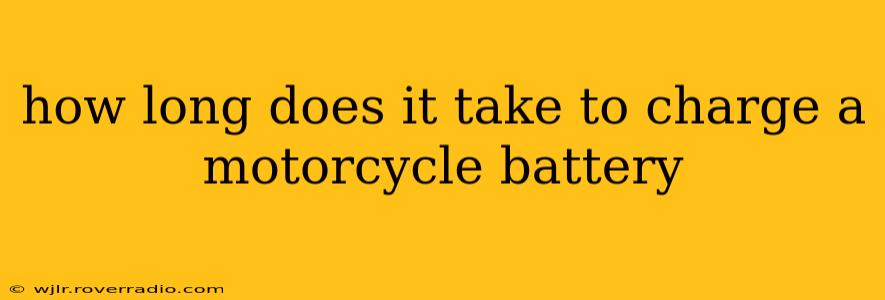Charging a motorcycle battery depends on several factors, making it impossible to give a single definitive answer. However, understanding these factors allows you to accurately estimate charging time and avoid damaging your battery. This guide will break down the process, answer frequently asked questions, and help you keep your motorcycle running smoothly.
What Factors Affect Motorcycle Battery Charging Time?
Several key elements influence how long it takes to fully charge your motorcycle battery:
-
Battery Capacity (Ah): Amp-hours (Ah) represent the battery's charge storage capacity. A higher Ah rating means a larger capacity and a longer charging time. A smaller battery will charge faster than a larger one.
-
Charger Type and Amperage: Different chargers offer varying amperage outputs. A higher amperage charger delivers more power, reducing charging time. However, using a charger with too high an amperage can damage the battery. Always consult your battery's specifications and charger instructions. Trickle chargers, for example, deliver a lower amperage and take longer, but are safer for longer-term charging.
-
Battery's State of Charge: A completely depleted battery will naturally take longer to charge than one that's only partially discharged.
-
Battery Age and Condition: Older batteries, or those in poor condition (sulfated, etc.), may charge slower and may not accept a full charge.
-
Ambient Temperature: Extreme temperatures (both hot and cold) can affect charging time and efficiency. Ideal charging temperatures are generally between 65-75°F (18-24°C).
How Long Does it Typically Take?
While there's no single answer, here's a general guideline:
- Small Capacity Battery (5-10 Ah) with a standard charger: Expect 4-8 hours for a full charge.
- Medium Capacity Battery (12-15 Ah) with a standard charger: Expect 8-12 hours for a full charge.
- Larger Capacity Battery (over 15 Ah) with a standard charger: Expect 12+ hours for a full charge.
Remember: These are estimates. Always consult your battery's manual and charger instructions for specific recommendations.
What Happens if I Overcharge My Motorcycle Battery?
Overcharging can significantly damage your battery, reducing its lifespan and potentially causing it to vent or explode. Modern chargers usually have safeguards to prevent overcharging, but it's crucial to monitor the charging process and disconnect the charger once complete.
Can I Use a Car Battery Charger to Charge a Motorcycle Battery?
While it's possible, it's generally not recommended. Car battery chargers often deliver higher amperage than motorcycle batteries can handle, potentially leading to damage. It's safer to use a charger specifically designed for motorcycle batteries.
How Can I Tell When My Motorcycle Battery Is Fully Charged?
Most chargers have indicators to show charging progress and completion. Some chargers even automatically switch to a trickle charge once the battery is full. If you are unsure, consult your charger's manual.
How Often Should I Charge My Motorcycle Battery?
The frequency of charging depends on how often you ride your motorcycle. If you ride regularly, the battery should stay adequately charged. However, if the motorcycle is stored for extended periods, regular charging (monthly or bimonthly) is recommended to prevent deep discharge and damage.
What if My Motorcycle Battery Takes Longer Than Expected to Charge?
If your battery takes significantly longer than expected to charge, it could indicate a problem with the battery itself (e.g., sulfation, cell damage) or the charger. Consider having your battery tested by a professional to diagnose the issue.
By understanding these factors and following the recommendations provided, you can ensure your motorcycle battery remains healthy and ready for the road. Remember to always consult your battery and charger manuals for specific instructions and safety precautions.
